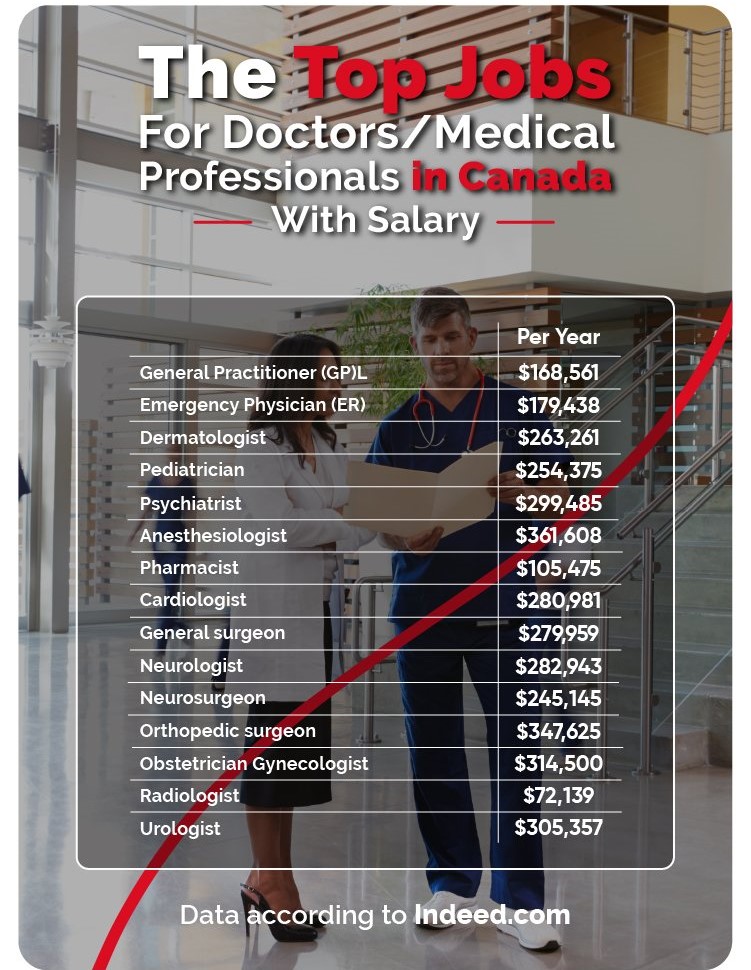Immigrate to Canada as a Doctor
The demand for medical experts is high everywhere in the world, including the Great White North. There are many job openings in the country’s health sector as a result of the country’s severe talent shortages, so if you’re a doctor looking for chances, the door is wide open for you to move to Canada.
Medical experts who want to bring their abilities to the land of the maple leaf have a variety of options available to them in the nation. Minister of Immigration, Refugees and Citizenship (IRCC) Sean Fraser commended the contribution immigrant physicians made to the health of the country in a statement issued in September 2022. He then proposed changes to streamline the procedure for foreign-born doctors to remain in Canada.
According to Fraser, this year alone, foreign nationals entering the Canadian medical community submitted more than 8,600 applications for temporary and permanent residency with the IRCC.
over the past seven years, the Provincial Nominee Program and the Express Entry System have helped more than 22,400 medical professionals, including more than 3,600 doctors and 8,600 nurses, get permanent residence in Canada.Minister of Immigration, Refugees and Citizenship (IRCC) Sean Fraser
Additionally, he said that more than 2,500 specialized doctors, 620 nurses, and 550 nurses’ aides and orderlies had their applications for work permits and work permit extensions approved.
We’ll look at the routes to pursue if you’re determined to immigrate to Canada in a moment. Let’s first examine the need for physicians in the nation.
Does Canada Have a Need for Doctors?
So long as there are patients, doctors will always be in demand. According to Statistics Canada, there were over 150,000 open positions among companies in the social assistance and health sectors in August 2022, for a vacancy rate of 6.4%.
The following are Job Bank’s predictions for the next three years regarding employment opportunities for medical professionals:
British Columbia: Excellent
Manitoba: Excellent
New Brunswick: Excellent
Newfoundland and Labrador: Excellent
Nova Scotia: Excellent
Ontario: Excellent
Prince Edward Island: Excellent.
Quebec: Excellent
Saskatchewan: Excellent
Yukon: Excellent
Alberta: Excellent
Northwest Territories: Insufficient information

The Top Jobs for Doctors and Medical Professionals in Canada with Salaries are shown below.

How to Submit a Foreign Doctor’s Immigration Application
Let’s look at how you may start the Canadian immigration process now that you are aware of the openings for medical professionals and the pay you can anticipate earning after you begin working as a doctor in Canada. But applying for both your visa and a job might be a daunting process.
As a result, we’ve identified 5 straightforward procedures that are crucial for beginning the application process.
Step 1: Check Your Eligibility
You must first determine your eligibility before submitting an application for any type of immigration or work permit in Canada.
You will save time and perhaps even disappointment if you do not qualify by doing this first. Each immigration program in Canada has specific requirements for applicants.
The main eligibility requirements are based on things like your:
Nationality
Language ability Age
household members
Education
Work history, etc.
Step 2: Pick Your Location
It’s crucial to decide where you want to live and work in Canada because doing so may make it easier to select a visa or immigration program.
Additionally, you can discover that a province or territory has employment opportunities but that the cost of living is too high or that the lifestyle doesn’t suit your needs or tastes.
Therefore, do your homework on the province of your choosing and make sure it’s a good fit for you and your family before you start searching for jobs as a doctor in Canada.
Step 3: Handle your paperwork
As a doctor, you will have to complete slightly more paperwork than those in other professions in order to live and work in Canada. If you have a foreign degree, you must first determine whether it is accepted in Canada.
This information is available from the World Directory of Medical Schools. If it is accepted, you might require an evaluation of your educational credentials (ECA).
Your degree, diploma, or certificate’s validity and conformity to Canadian standards are confirmed by an ECA.
The following is a list of authorized businesses that can conduct your assessment:
International Credential Evaluation Service, International Qualifications Assessment Service (IQAS), World Education Services, and the University of Toronto School of Continuing Studies all offer comparative education services.
Additionally, you will be required to pass Parts I and II of the Medical Council of Canada Qualifying Examinations (MCCQEs), which are two exams administered by the medical council of Canada.
Part I evaluates your clinical judgment and medical knowledge, while Part II evaluates your ability to use that information, demonstrate your clinical abilities, and exhibit professional demeanor. Before taking Part II, you must pass Part I.
You will receive a Licentiate of the Medical Council of Canada (LMCC), which is necessary to submit an application for a medical license to practice in Canada, once you have passed both tests and can demonstrate that you have at least 12 months of postgraduate clinical medical training. A Certificate of Registration and a certificate to show at your new medical offices in Canada will be given to you along with your LMCC.
When you go to Canada, you have to finish additional medical training under the relevant provincial or territorial medical regulatory authority.
For more information on what will be required of you when you move to Canada, it is crucial to confirm this beforehand with the medical authority in your preferred province or territory. Each provincial and territory’s medical authorities are listed below.
Medical Regulatory Authorities in Canada | |
Province/Territory | Medical Regulatory Authority |
Alberta | |
British Columbia | |
Manitoba | |
New Brunswick | |
Newfoundland and Labrador | College of Physicians and Surgeons of Newfoundland & Labrador |
Northwest Territory | |
Nova Scotia | |
Nunavut | Nunavut Department of Health and Social Services Medical Registration Committee |
Ontario | |
Prince Edward Island | |
Québec | |
Saskatchewan | |
Yukon | |
Step 4: Apply for a job in Canada
It’s a good idea to look for work before moving to Canada. You will have a better probability of receiving a request to submit an application for permanent residency.
Additionally,
It will ease your mind knowing that you won’t have to deal with the additional burden of looking for a job when you arrive in addition to all the other arrangements you will need to make.
Step 5: If You Plan to Work in Canada, Apply for a Work Permit Temporarily
According to recent reports, the IRCC is committed to giving temporary resident work visa applications for medical professionals, particularly doctors, top priority.
Let’s say you receive an offer for a temporary or permanent job in this industry.
In that situation, in order to reside and work in Canada for the term of your contract, you must obtain a Canadian work permit. Should you want to strengthen the permanence of your status in Canada, it is also a positive move.
There are two sorts of work permits: open work permits and employer-specific work permits.
If you have an Employer-Specific Work Permit, you must work in Canada in accordance with the terms of your work permit, which include the name of your Employer, the duration of your Contract, and the Place of Employment. You must receive a copy of the labor market impact analysis from the employer (LMIA).

On the other hand, if they are not on the IRCC’s list of employers who don’t adhere to its requirements, you will be able to work for any employer in Canada if you have an open work visa.
Step six: Choose your Canadian immigration program
There are several ways to become a doctor in Canada, but we’ve highlighted the top two that will increase your chances of success:
- Provincial Nominated
- Express Entry System Program
According to IRCC, the Provincial Nominee Program and Express Entry have helped
- more than 22,400 individuals become permanent residents of Canada, including little over 3,600 physicians and 8,600 nurses.
Which Immigration Programs Are Suitable for Medical Personnel?
Express Entry
Under the Express Entry System, doctors have access to the Federal Skilled Worker Program and the Canadian Experience Class as economic programs (CEC). Every two weeks, draws are held when your EE application will be evaluated and ranked against those of other applicants using the Comprehensive Ranking System.
IRCC has made amendments that remove doctors who are already employed as temporary residents from some of the requirements for permanent residency through Express Entry programs in response to Canada’s severe physician shortage. As they are frequently regarded as self-employed, doctors who are currently licensed to practice in Canada but have temporary resident status are frequently ineligible for the Express Entry System.
In Canada, if you are self-employed, you will not be eligible for the majority of Express Entry-eligible economic immigration options. However, you can be eligible for the Express Entry program if you have at least one year of work experience in Canada or another nation. Sean Fraser, the minister of immigration, claims that this barrier will prevent foreign doctors from leaving the nation.
Program for Provincial Nominees
If you have a legitimate job offer in Canada that satisfies the labor requirements of that province or territory, you are eligible to live and work there under the Provincial Nominee Program. Each province or territory has a separate PNP with a list of certain in-demand professions. You will receive an ITA for Canadian permanent residence if you are nominated by a province, which is worth an additional 600 points.
The application process will be sped up from roughly 18 months if you apply directly to the province to six months when you apply through Express Entry, as was previously mentioned. Nearly every PNP has a stream connected to the Express Entry system.
Below is a list of PNP streams or categories, in each province or territory, for medical professionals who want to immigrate to Canada.
Canadian Immigration for Doctors | |
Province/Territory | Immigration Stream/Category |
Alberta | Alberta Opportunity Stream |
British Columbia | Healthcare Professional Category |
Manitoba | Skilled Workers Overseas Stream |
New Brunswick | Express Entry Skilled Worker Stream |
Newfoundland and Labrador | Skilled Worker Stream |
Northwest Territories | Skilled Worker Stream |
Nova Scotia | Physicians Stream |
Ontario | Express Entry Human Capital Priorities Stream |
Prince Edward Island | Express Entry Stream |
Saskatchewan | International Skilled Worker Category |
Yukon | Skilled Worker Stream |
When you choose to use our expertise and government-trusted services, you will receive:
- An in-depth eligibility assessment
- Guidance on which of the over 100 immigration programs and visas to choose from;
- An immigration plan tailored to your individual needs;
- A review and submission of all application forms and documentation;
- Support through every step of the application process.

The first step towards moving to Canada is to get an assessment of your specific situation. Call us today at +1 613.222.7154 for an assessment to see if you are eligible to move to Canada, or fill out our online assessment form.







